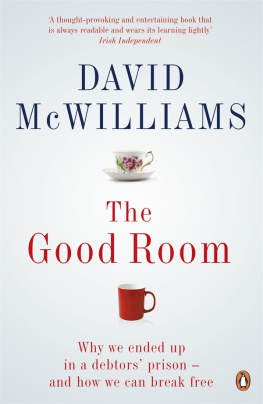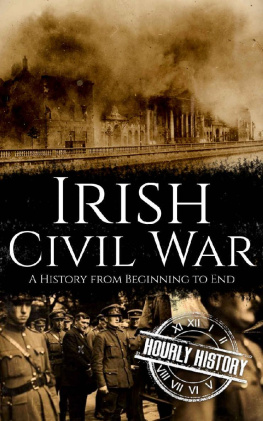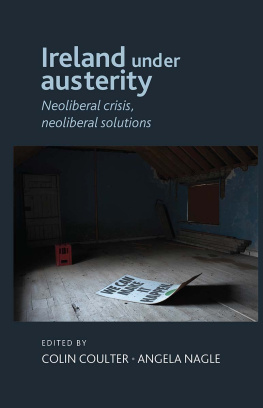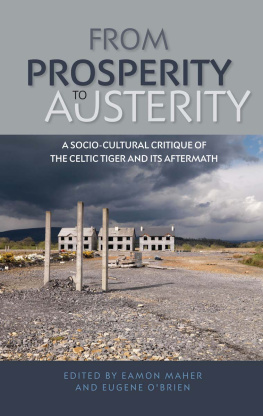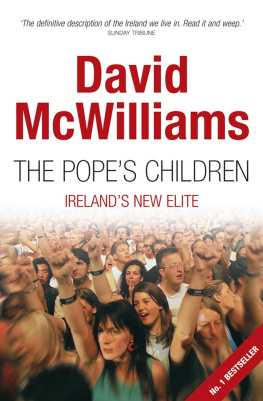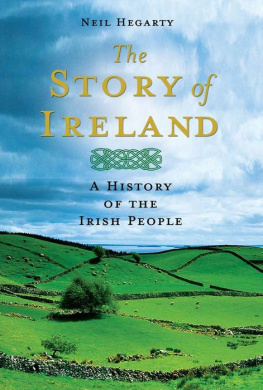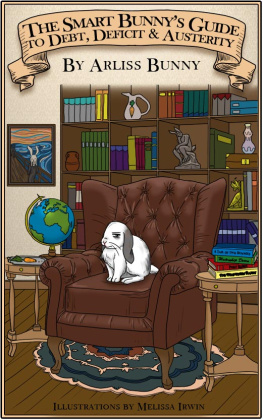
DAVID MCWILLIAMS
The Good Room
Why we ended up in a debtors prison and how we can break free
THE GOOD ROOM
David McWilliams is Irelands most influential economist, and a columnist for the Irish Independent and the Sunday Business Post. He is the author of the bestsellers The Popes Children, The Generation Game and Follow the Money.
www.davidmcwilliams.ie
To Sian, Lucy and Cal
1. Generation Skype and Hopes Children
The footballers of Castlegregory
The drive from Castlegregory, on the Dingle peninsula, to Killarney is a round trip of just over a hundred kilometres. In preparation for the All-Ireland junior club championship of 2010, the Gaelic footballers of Castlegregory trained in Killarney, to suit the lads coming from their universities in Cork and Limerick. The round trips to Killarney from those cities are 170 and 250 kilometres respectively.
When youre winning, the season stretches: each win buys the team a few more weeks. For the full year leading up to the final in Croke Park, Castlegregory trained without a break. No one was complaining. The Dingle peninsula is football country.
Matches in the local West Kerry league toughen everyone up. Castlegregory against the likes of Dingle these matches regularly pit neighbours and families head to head. Scores are settled, not just counted. Next up is the county league, eleven games between March and October; and in parallel the county championship knockout tournament. From the county final in July, training was ratcheted up a notch or seven for the Munster championship and then on to the Holy Grail, the All-Ireland.
Lives were offered up on the altar of GAA success. There was always an all-day strategy session on Saturday, followed by the game on Sunday. Scouts were sent out across Munster to snoop on the opposition. Sometimes they would venture further afield, to Meath or Galway, to see what the other teams were at; nothing was left to chance.
The man in charge of the players mental and physical preparation was the manager, Ger OCallaghan. Ger knew that the body was the simple part. By building up stamina and strength you can manage the physical side. The vomit-inducing runs on the beach with the rain driving in hard from the Atlantic, or up the mountains back towards the Gaeltacht these were par for the course. The tricky bit, OCallaghan understood, is the brain. If a mans head isnt right, it can destroy him in a game; and once one man has lost the mental battle, the whole team becomes infected.
The most important thing was the knowledge that success was possible. In 2002 the Gaeltacht Club, from the other side of Mount Brandon, had won the All-Ireland. Why couldnt Castlegregory?
The final was held in Croke Park on Valentines Day 2010. The Mansells came home from Boston for it, as did the Deans and Spillanes from Australia, and countless others Fitzgeralds, OConnors, OCallaghans, Horgans and Sullivans from London.
The night before the final, the team bunked down at the Clarion Hotel in Liffey Valley. That night the lads talked about all the battles past and what they had learned from each one. They re-examined the clash with the Claremen of Clooney Quin and then the scare at Glanworth, deep in the good farming land of North Cork, when the wheels nearly came off. They reworked the pivotal moments of their struggle with Mountcollins of West Limerick, and laughed about the huge win over local Kerry rivals Beaufort. Then there was Longwood of Meath in the semis, which could have gone either way right up to the final whistle. Castle had come through all of these, and the lads were stronger for the experiences.
Father Gene ODonnell, a Castlegregory man with a parish in America, had come home for the final. On the eve of the showdown with Kiltimagh of Mayo, he took confession. You might as well start the day clean, even if you didnt finish it that way. And on the morning of the game, Father Gene said Mass for the team in the same function room in which they had watched match videos all the previous day. Half-eleven Mass was less about divine intervention than about routine. This is what they did at home on a Sunday and Ger knew that he had to adhere to the familiar rhythm.
During the Creed, Ger OCallaghan thought to himself: What do we actually believe?
We believe in ourselves, in our parish. We believe in our place. We believe in home. We believe in each other.
This was their chance. By night, theyd be winners or losers. No matter what the outcome, they were doing it for their place, the place that had made them.
At half-time the Mayo men were ahead by two points. With two minutes to go there were still two points in it, and Castle needed something special. Long free into the box, deft flick, back of the net. Noses in front. Kiltimagh free, last kick of the game, floated high and over. Scores level: twenty minutes of extra time.
All the sweat and pain in those 112 training sessions counted now. Ger knew his boys were harder. They were fitter. They could do it. He looked into their eyes for weakness; there was none. Ger told them to go and do it for the parish.
When the ref blew, the scoreboard told it all: Castlegregory 114, Kiltimagh 015.
For the people of Castlegregory, nothing not even the most thrilling victories of the great Kerry teams over the years could compare to the feeling of winning an All-Ireland club final.
The local Guards escorted them home, sirens going, lights flashing. Five kilometres out from the village, the team were met by the sight of a huge bonfire blazing on the high ground, before the road veered leftwards down to the sea. The place was a mass of green and gold. A tourist might have thought they had brought people in from all over Kerry. But they hadnt. These were their people. Castle men and women from all over the world changed their annual holidays to be home to celebrate something you cant buy: the local, the rural home itself.
The village was heaving that night. Ferriters stayed open until the morning, as did Leonards and Murrays. They were winners. Castlegregory, a tiny place in West Kerry wedged between the mountains and the Atlantic, were All-Ireland champions for the first time.
When it all settled down, Ger OCallaghan (manager, father, electrician, and now local hero) knew he could build on the victory. Most of the team were young. He could mould them, and they could keep on winning.
Two years later
The fire is blazing at the back of Ferriters. The place smells welcomingly of turf. But theres hardly anyone to welcome. Ger OCallaghan is sitting at the back, waiting to watch the rugby Ireland against Wales. The bar is empty except for one farmer up at the counter. The village is silent.
The brilliant 2010 team never progressed. Not because they werent good enough, but because they disappeared.
Eight of the fifteen players who started the 2010 All-Ireland final left the country over the next two years. Of the twenty-one lads in the panel who were on the pitch in Croke Park that day, twelve are gone. Five are in Australia. Three are in London. The others are scattered all over the place.
The tale of what happened to the 2010 All-Ireland junior champions is the story of a generation of Irish people. They were born during the last great Irish recession of the mid 1980s. They watched Italia 90 as toddlers and just remember Ray Houghtons chip over the Italian keeper at Giants Stadium in 94. They were in primary school when the IRA ceasefire was announced. By the time they were doing the Leaving Cert, the banking bonanza was already in full swing. They left school amidst the credit binge of the mid noughties, when Ireland was hyping itself up to anyone who cared to listen, driven by the when I have it I spend it creed of the finance minister, Charlie McCreevy.

